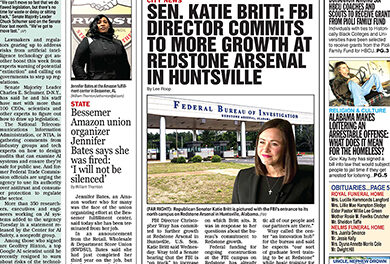Nile Bennett, a junior at Miles College in Fairfield, Alabama, said his internship with the Yale University Office of Environmental Health and Safety (EHS) this summer opened his eyes to environmental compliance. (Amarr Croskey, For The Birmingham Times)
” data-medium-file=”https://www.birminghamtimes.com/wp-content/uploads/2024/09/DSC3792-300×200.jpg” data-large-file=”https://www.birminghamtimes.com/wp-content/uploads/2024/09/DSC3792-1024×683.jpg” tabindex=”0″ role=”button” />
By Sym Posey | The Birmingham Times
Being part of the first group of Historically Black College and University (HBCU) students to intern for the Yale University Office of Environmental Health and Safety (EHS) this summer meant a lot to Nile Bennett, 20, a junior at Miles College in Fairfield, Alabama.
“At first it didn’t register in my head that I was making history. Then, when I kept seeing social media outlets post about me and my school promote me, it hit me that I did something impactful,” Bennett told The Birmingham Times.
The Yale program is designed to “empower and inspire the next generation of talent by offering hands-on experience and exposure to a diverse range of viable professions …”, according to the EHS website.
Bennett, who was an Environmental Affairs Intern, was one of 10 EHS 2024 Summer Interns and one of two first-ever HBCU students in the program. Brooke Jones, a senior biology major at Clark Atlanta University in Atlanta, Georgia, was a Biological Security Intern.
“I did a lot of compliance work. I was basically an environmental compliance officer, which means I got to go to power plants, athletic facilities, or different facilities around Yale to make sure they’re complying with the regulations set by the [U.S. Environmental Protection Agency (EPA)] for the state of Connecticut,” Bennett said of the program that ended in late July.
The environmental justice major added, “Going [to Yale], doing field work, testing water and air emissions, that was my job for the whole summer. Also, doing permit work and filling out a lot of paperwork.
“Being in that program kind of opened my eyes to the field of environmental compliance. It’s something I thoroughly enjoy, maybe because I like doing desk work with a little bit of fieldwork. I can’t wait to just get out into the field.”
” data-medium-file=”https://www.birminghamtimes.com/wp-content/uploads/2024/09/DSC3746-300×200.jpg” data-large-file=”https://www.birminghamtimes.com/wp-content/uploads/2024/09/DSC3746-1024×683.jpg” tabindex=”0″ role=”button” class=”wp-image-122682 size-full” src=”https://www.birminghamtimes.com/wp-content/uploads/2024/09/DSC3746.jpg” alt=”” width=”1600″ height=”1067″ srcset=”https://www.birminghamtimes.com/wp-content/uploads/2024/09/DSC3746.jpg 1600w, https://www.birminghamtimes.com/wp-content/uploads/2024/09/DSC3746-300×200.jpg 300w, https://www.birminghamtimes.com/wp-content/uploads/2024/09/DSC3746-1024×683.jpg 1024w, https://www.birminghamtimes.com/wp-content/uploads/2024/09/DSC3746-768×512.jpg 768w, https://www.birminghamtimes.com/wp-content/uploads/2024/09/DSC3746-1536×1024.jpg 1536w, https://www.birminghamtimes.com/wp-content/uploads/2024/09/DSC3746-630×420.jpg 630w, https://www.birminghamtimes.com/wp-content/uploads/2024/09/DSC3746-640×427.jpg 640w, https://www.birminghamtimes.com/wp-content/uploads/2024/09/DSC3746-681×454.jpg 681w” sizes=”(max-width: 1600px) 100vw, 1600px” />
BSC Roots
Before enrolling at Miles College, Bennett attended Birmingham Southern College (BSC), where he was first a communications major. During his second semester, he took a “Suitability in the South” course in environmental science, “[and] it kind of came naturally to me,” said Bennett, who was raised in Atlanta, Georgia.
Even at that time, Bennett remembered “hearing rumors about the possibility that [BSC] would be facing closure,” he said. “My dad was fearful for my opportunity to play football because that’s why I was originally at BSC. He told me that Miles was interested, so I went on a visit [in 2023]—and the rest is history.”
While at BSC, Bennett was a defensive end/edge and helped the Panthers to a second-place finish in the Southern Athletic Association (SAA) and another winning season before its closure. He found out about the closing through a group text message. The private liberal arts school in the Bush Hills community on the western side of Birmingham, closed its doors on May 31, 2024, after a nearly 170-year history.
“I called and reached out to everyone that I considered a friend and told them I was sorry. I even reached out to my coaches and told them I’m sorry about all this happening. It was hard. BSC has a very dear place in my heart,” Bennett said.
Transferring to Miles from BSC was a “culture change,” he added. “I’ve been in private schools for at least half my life or so. With BSC being a [predominately white institution (PWI)] and [Miles] being an [HBCU], it was a little bit different. But once I got adjusted, it felt like family.”
Global Warming
As an environmental justice major, Bennett is paying close attention to this year’s presidential election.
“Ever since I was able to vote, my mother has always instilled in me the significance of voting, how it’s my constitutional duty, and she emphasized the sacrifices that were made for a person like me,” Bennett said.
“Being an environmental science major is more important now than ever,” he added. “Going for the right candidate ensures that the right legislation that benefits or promotes green energy and decreases our carbon footprint is especially important because it’s the main thing leading to global warming, or the increase in temperatures around the globe. … [These climate changes] affect suffering habitats like the Great Barrier Reef, [the world’s largest coral reef system, located off the northeastern coast of Australia], and the polar ice caps, home to animals like polar bears and penguins.”
When he’s not studying, Bennett fills his time on the track and field team, for which he throws shot put and discus. He remains proud of what he’s been able to accomplish as a 20-year-old, especially during his internship at Yale.
“[One of my deans] told me that I set an example that anybody at an HBCU can achieve what may seem impossible,” said Bennett. “I take that with pride.”











